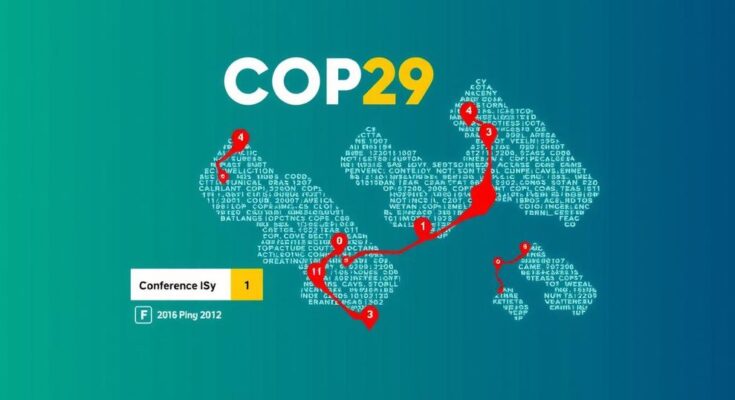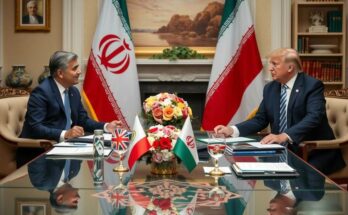COP29 will be held in Baku, Azerbaijan, from November 11-22, 2024, where global leaders will address climate finance for developing nations. The absence of key leaders, including President Biden, poses challenges to the conference’s objectives. Financing agreements and strategies are critical topics, alongside concerns about the host nation’s fossil fuel development amidst ongoing climate crises.
The COP29 climate conference, an annual UN meeting focused on global climate change, is set to take place in Baku, Azerbaijan, from November 11 to November 22, 2024. This summit aims to address critical climate issues, primarily facilitating financial support for developing countries to combat climate change. Unfortunately, notable absences from significant leaders, including US President Joe Biden and China’s Xi Jinping, may hinder the potential for substantial agreements. Moreover, Azerbaijan’s intent to expand its fossil fuel production raises concerns regarding the credibility of its leadership in driving the climate agenda forward. At the COP29 meeting, representatives from nearly 200 countries will convene to negotiate actionable solutions for climate change, reinforcing their commitment to the Paris Agreement established in 2015. A prominent topic of discussion will be financial commitments to assist developing nations as they strive to reduce carbon emissions and adapt to the ongoing impacts of climate change. Notably, there is an urgent need to meet a target of contributing over $1 trillion annually in climate finance by 2030, as nations such as those in Africa and small island states articulate their need for increased aid. However, past promises have often fallen short of expectations, leading to skepticism about the potential outcomes of COP29. Challenges at COP29 will also include revisions to national climate action plans. Each country is expected to present updated strategies to curb greenhouse gas emissions. This year is pivotal, as any lackluster plans could jeopardize efforts to limit global warming to within 1.5 degrees Celsius. In light of recent negotiations failing to yield concrete results, particularly regarding fossil fuel reliance, there is an urgent need for consensus on these critical issues. The selection of Azerbaijan as the host country is controversial due to its plans for expanding gas production and its poor human rights record. Observers have raised concerns that Azerbaijan’s increased fossil fuel ambitions may correlate with the climate conference’s goals to mitigate climate change effects caused by fossil fuel dependence. The circumstance is further aggravated by the electoral success of Donald Trump in the United States, where his known skepticism towards climate change issues may undermine international cooperative efforts. Despite these challenges, it is essential to acknowledge the severity of the climate crisis. According to forecasts, 2024 is anticipated to be the warmest year on record, influenced by extreme climate events across the globe. The COP29 results will dictate future climate policies and the extent to which nations can mitigate climate change impacts effectively. In conclusion, the outcome of COP29 is crucial for shaping a sustainable future amidst various political, economic, and environmental challenges. With substantial key players absent and the host nation under scrutiny for its fossil fuel initiatives, the conference must overcome doubt and division to secure meaningful progress towards climate commitments. The global community must unite to forge a path forward that prioritizes environmental integrity and equitable support for those most affected by climate change.
COP29, the 29th Conference of the Parties to the UNFCCC, is the foremost international summit dedicated to addressing climate change. It assembles representatives from nearly two hundred countries to negotiate strategies and commitments aimed at combating global warming and its catastrophic effects. With this year’s conference scheduled in Azerbaijan, discussions will focus particularly on financing initiatives that support developing nations in their climate efforts and the fulfillment of pledges made under previous agreements, like the Paris Accord. The meeting is occurring against a backdrop of leadership absences from major economies and contentious international relations, which may influence the progress and effectiveness of the dialogues planned at this summit.
The COP29 climate conference marks a critical juncture in the international fight against climate change amidst various geopolitical issues and significant absences of key leaders. The pressing agenda will emphasize the necessity for financial commitments to assist vulnerable nations while requiring updated national climate strategies to combat rising temperatures. While challenges persist, especially concerning the host nation’s fossil fuel ambitions and the implications of leadership changes in the United States, this conference remains crucial in reinforcing the global commitment to addressing climate change equitably and effectively.
Original Source: www.bbc.co.uk




